Community-led initiatives for climate change adaptation recognized at COP27
Local Adaptation Champions Awards recognize four organizations for their pioneering work in leading climate change adaptation for vulnerable local communities.
S
harm El-Sheikh, Egypt, 12th November 2022 – The four winners of the Local Adaptation Champions Awards, organized by the Global Center on Adaptation (GCA), were announced today at the COP27 climate summit in Egypt. During the ceremony, the Minister of Environment, Climate Change and Environment for Bangladesh, Md. Shahab Uddin, also endorsed the Principles for Locally Led Adaptation.
Speaking during the event, His Excellency Shahab Uddin said: “Locally led adaptation is front and center in our climate policies – including the newly launched National Adaptation Plan, and the Mujib Climate Prosperity Plan. The Government of Bangladesh is, and has always been, a champion of locally led adaptation. We therefore strongly support the Principles for Locally Led Adaptation.”
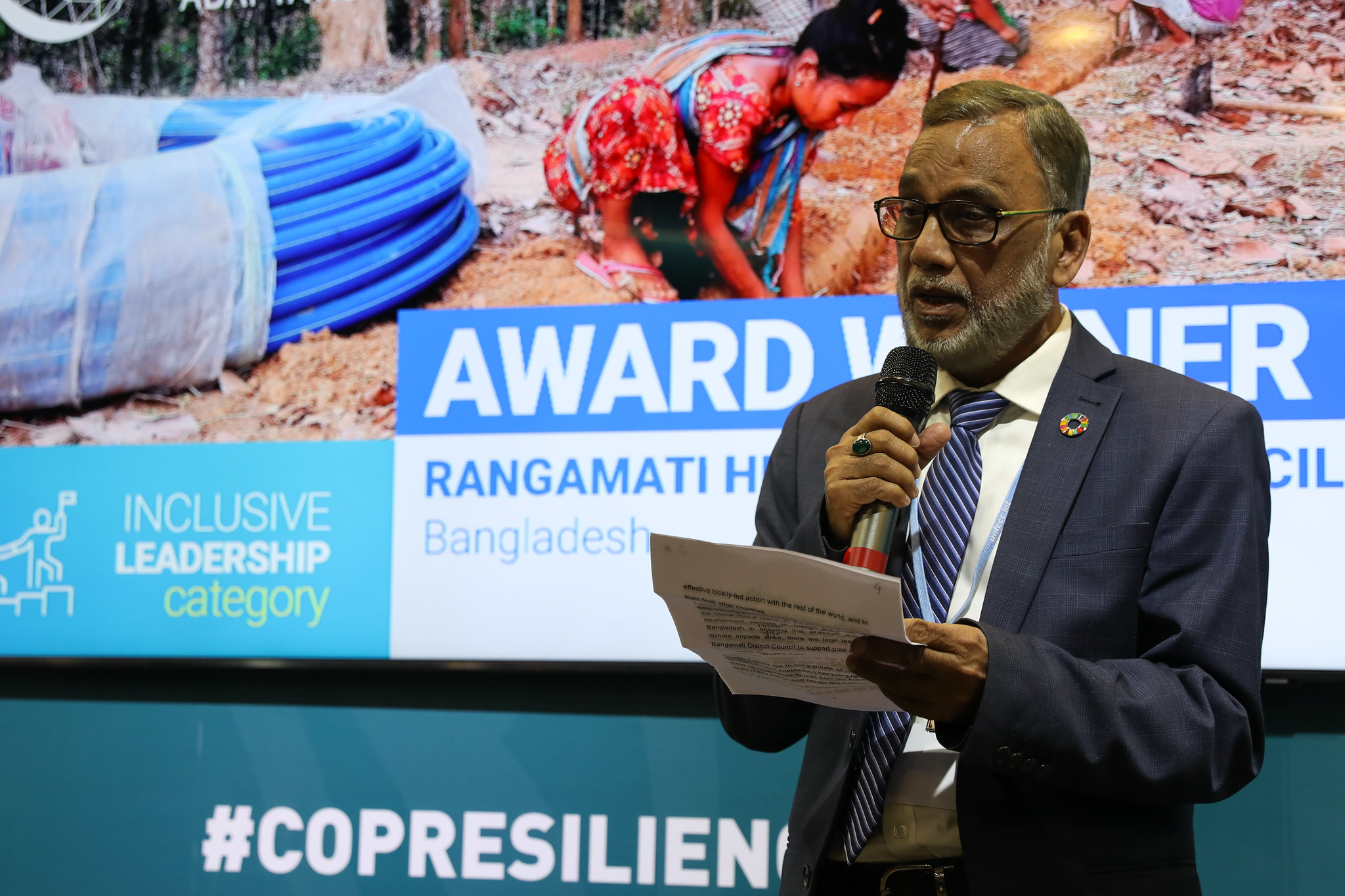
All photos courtesy of UN Climate Change/Kiara Worth
As of August 2022, over 80 organizations have endorsed the principles, committing to make changes and strengthening existing efforts to meet this urgent adaptation agenda.
The awards, developed in support of the principles, recognize locally led efforts to adapt to the negative impacts of climate change across four categories: financial governance, inclusive leadership, capacity and knowledge, and local innovation. Each winner will receive €15,000 in funds to further the work they are doing in the spirit of the locally led adaptation principles. They will also have access to a global network of changemakers.
The awards recognize locally led efforts to adapt to the negative impacts of climate change across four categories: financial governance, inclusive leadership, capacity and knowledge, and local innovation. Each winner will receive €15,000 in funds to further the work they are doing in the spirit of the locally led adaptation principles. They will also have access to a global network of changemakers.
The final list of winners, picked from a shortlist of 20 finalists, includes a diverse selection of organizations from Kenya, Bangladesh, India, and Nepal.
“Our winners show that community-centric and locally led solutions to the climate crisis exist, but they require support and recognition to be scaled up, and to achieve the most impact. The GCA is working with international financial institutions and governments to introduce these best practices into bigger funding streams, while maintaining what is at the heart of these impactful solutions and of successful adaptation – local leadership,” said Professor Patrick Verkooijen, Chief Executive Officer of the Global Center on Adaptation.
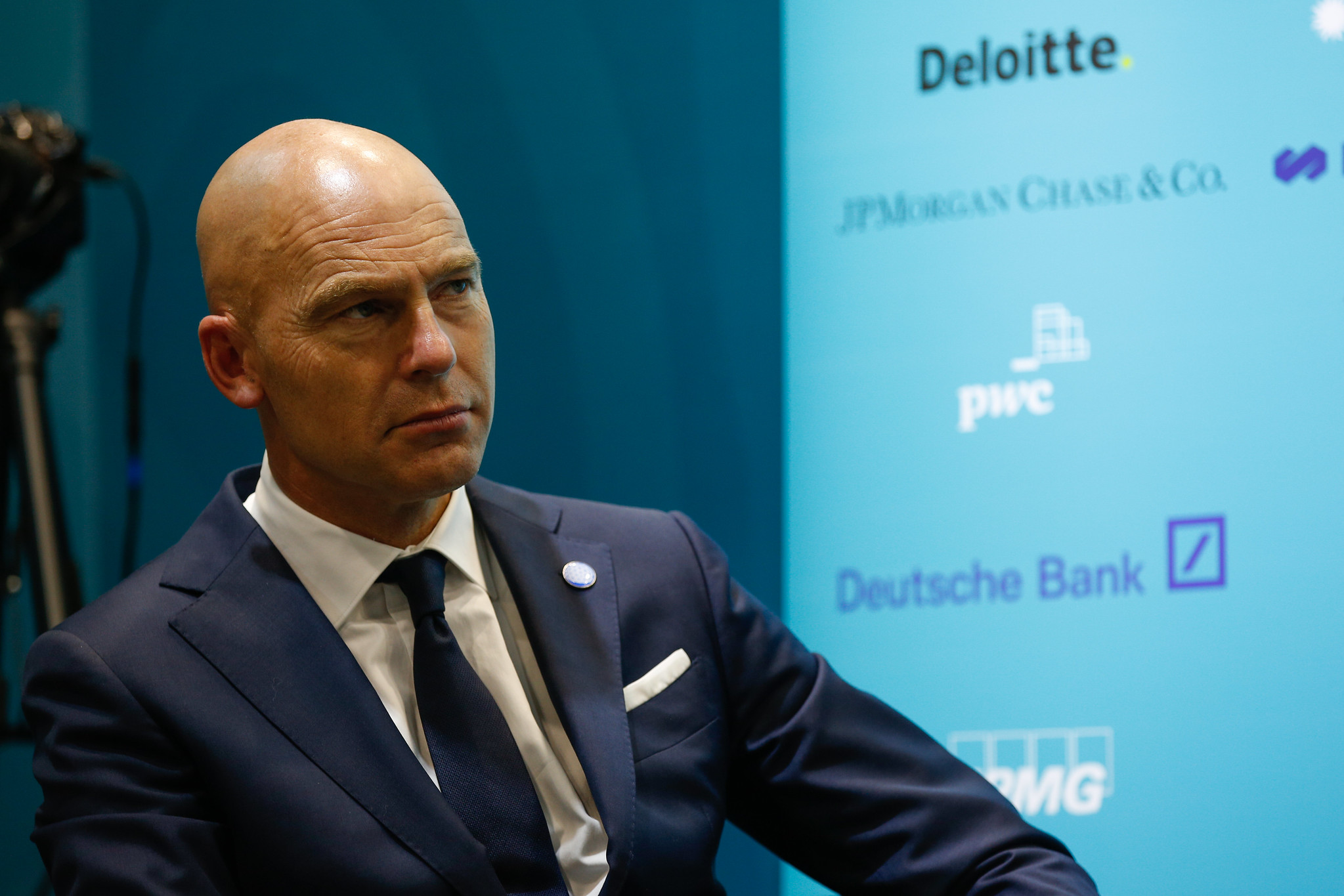
Also speaking at the event, Ken O’Flaherty, COP26 Regional Ambassador to Asia-Pacific and South Asia, welcomed the creation of the awards to help accelerate locally led adaptation: “The Foreign, Commonwealth & Development Office (FCDO) Bangladesh is pleased to support this activity as part of our partnership with the Global Center on Adaptation and the Government of Bangladesh to accelerate action on adaptation and reward those on the frontline for their efforts. This awards ceremony is important in highlighting what good locally led adaptation looks like and sharing experiences globally. It’s encouraging that so many proposals were received, and that the website had over 2 million visitors, indicating that there are plenty more examples of locally led adaptation across the world. Our partnership is also working to mobilize greater amounts of finance for locally led adaptation, and to share knowledge, information and data on LLA to aid planning, implementation and monitoring. Our partnership with GCA is part of the FCDO’s bilateral climate and environment program announced at COP26 in Glasgow. The program will help deliver a more climate-resilient, less carbon-intensive and cleaner Bangladesh. With a proposed budget of £120m, the program will provide a comprehensive approach to the country’s adaptation, energy, environmental management, and climate governance challenges.”
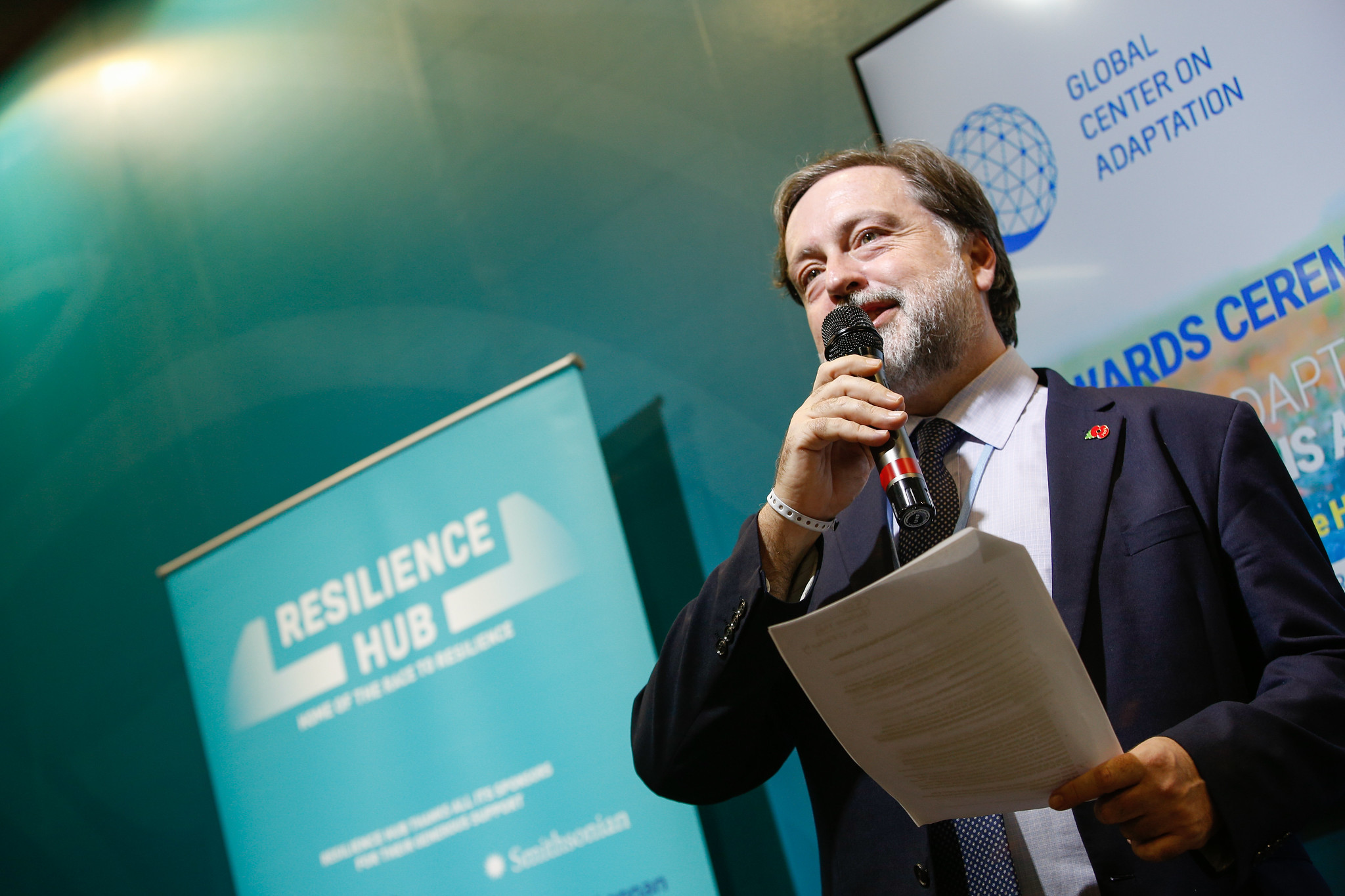
Award for Financial Governance
Receiving the award for the financial governance category is Kenya’s Adaptation Consortium, which supports communities to create, access, and use climate finance from varied sources to reduce their vulnerability to climate change, while strengthening public participation in the management and use of funds.
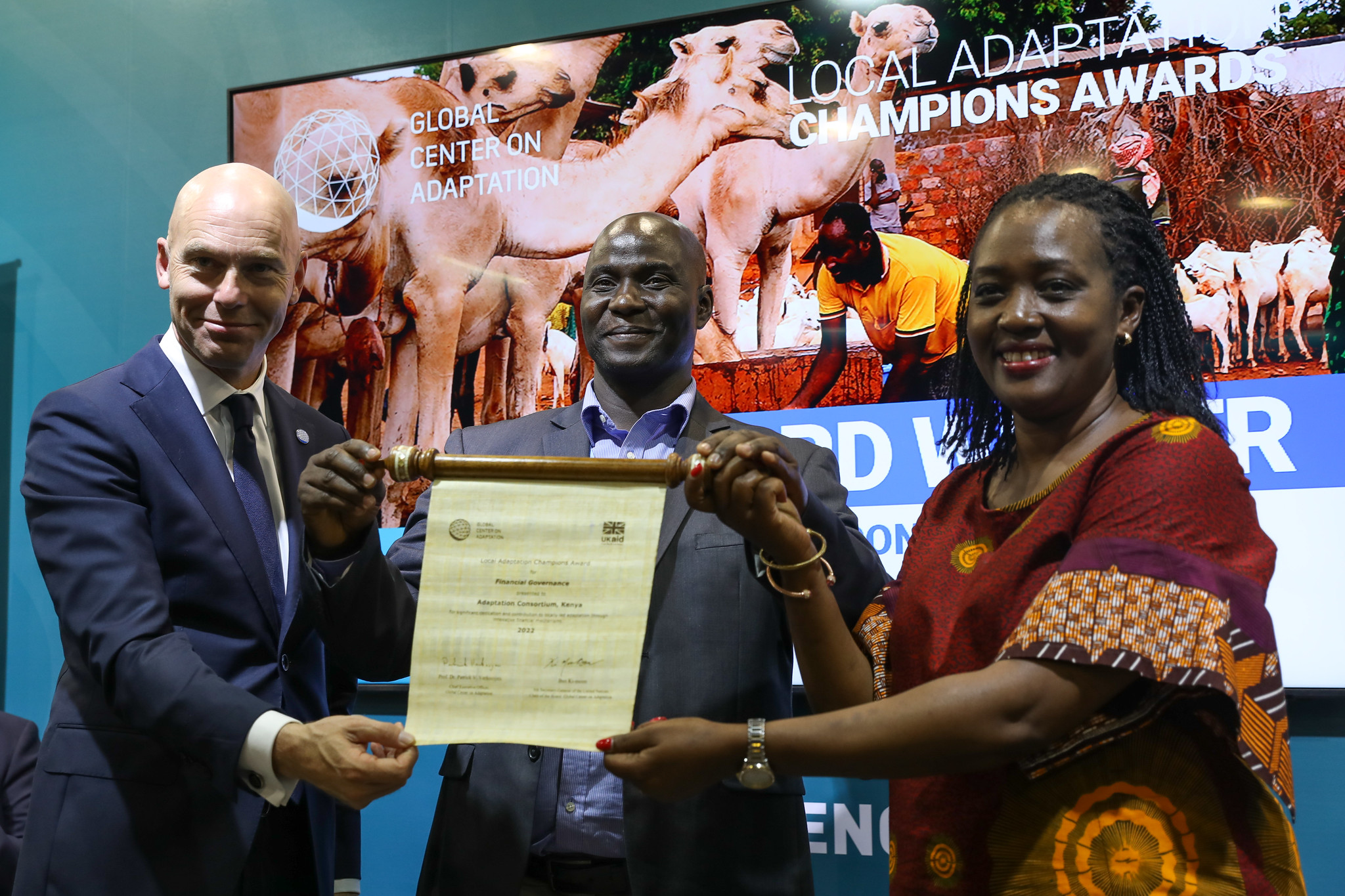
The Consortium has also designed a County Climate Change Fund to attract climate finance from public, private, local, and international sources, providing subnational governments and communities a predictable and sustained source of finance for adaptation and resilience-building efforts.
Roselinda Soipan Tuya, Ministry of Environment and Forestry, Kenya, who gave the award to Victor Orindi, National Coordinator of the Adaptation Consortium noted that, “The GCA awards are about inspiring and motivating innovative and potentially scalable interventions. As a country, we are already taking forward many of the good practices and lessons from Ada work through the government-led/World Bank-supported Financing Locally Led Climate Action (FLLoCA) program among others. We hope that more partners can join our national-level efforts to provide adequate resources to finance the priority adaptation interventions identified by our people.”
“We noticed that while a lot was happening in climate finance, it was not happening in a coordinated manner. Vulnerable communities were not able to access funds and we noticed a barrier in sustained funding streams; and that communities could not have a say in the work to be implemented. So, we started bringing people together towards a shared vision empowering the community,” said Victor Orindi, National Coordinator of the Adaptation Consortium.
“Responding and adapting to climate challenges largely depends on context; and the only way you can get that right is by ensuring that those who are impacted have a say in terms of how and where things are done. So, enabling them to be involved in planning process ensures that their voices count at the end of the day,” Orindi added.
Award for Inclusive Leadership
In recognition of their work on inclusive leadership, the Rangamati Hill District Council from Bangladesh are among the award-winning organizations. The Council works with local communities to combat worsening droughts, landslides, and flash floods through solar power-based safe water supply facilities and the provision of safe drinking water during crises.
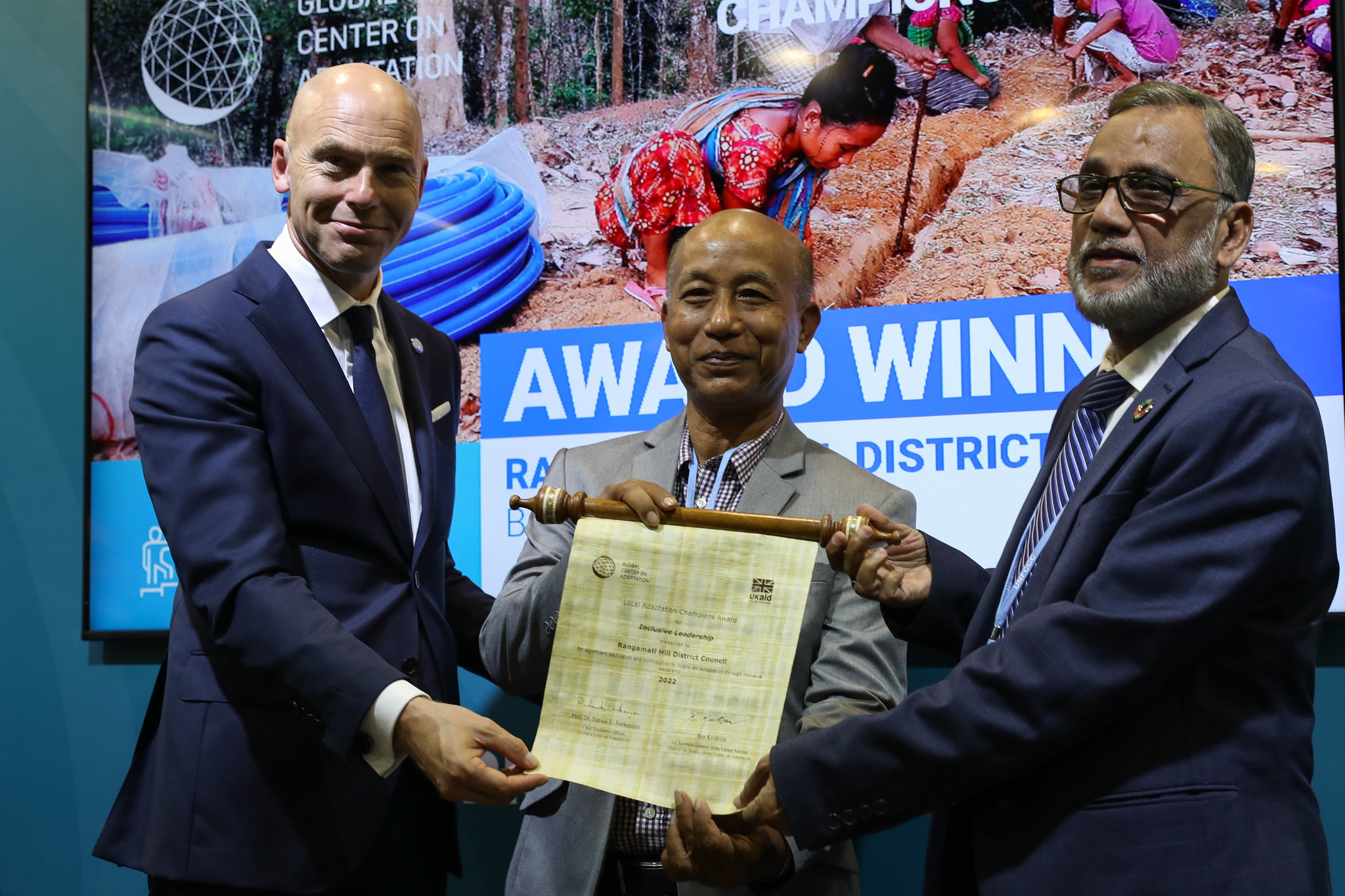
The Council has also established a climate resilience committee and supported local communities in conducting climate vulnerability assessments, which have fed into the creation of local resilience plans.
Md. Shahab Uddin, Minister of Environment, Climate Change and Environment for Bangladesh noted: “It is especially significant for us that the Rangamati Hill District Council showed local and inclusive leadership to find a solution to their problems of drought and water shortages. They have continued in the Bangladeshi tradition of demonstrating the power and success of locally-led solutions.”
“Now communities have clean drinking water and they can water their dragon fruit, mango and lychee orchards, and cultivate their land for food and income,” said Arunendu Tripura, Public Relations Officer for Rangamati Hill District Council. “Also, half of our members are women. I asked them why they chose to install this water facility, and they said as soon as they were able decide on a solution, they chose to end the misery they face in fetching water, to curb their suffering. This gave me great satisfaction,” Tripura said.
Award for Capacity and Knowledge
Receiving the award in the capacity and knowledge category is the Indian non-governmental organization Swayam Shikshan Prayog for their work in supporting women farmers to adopt more resilient and sustainable agricultural practices in Maharashtra, India, where a focus on water-intensive cash crops currently leaves farmers exposed to climate shocks such as poor monsoon seasons.
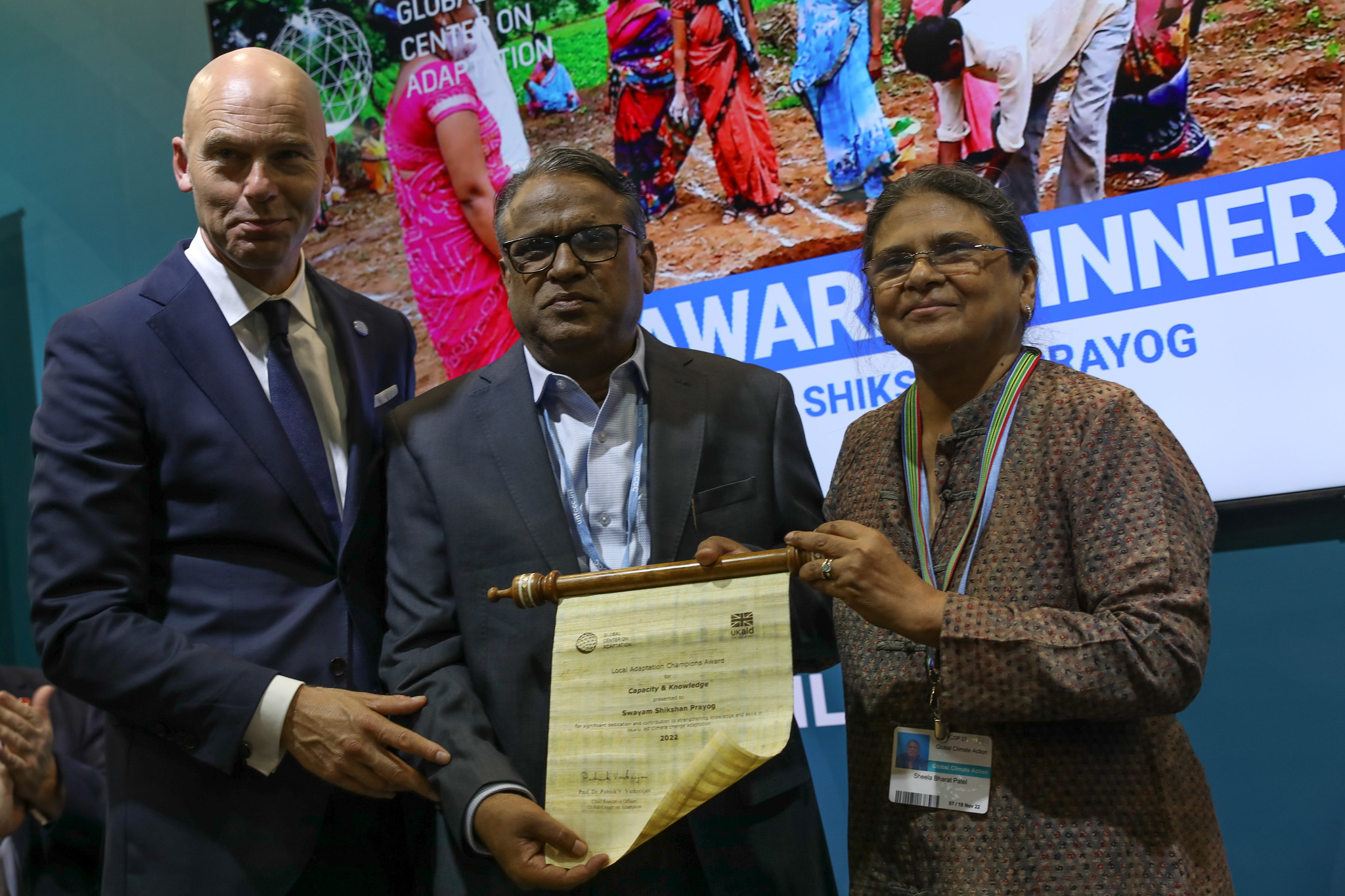
The organization developed a women-led Climate Resilient Farming model, helping farmers to transition from cash crops to food crops, as well as from chemical to bio inputs, while also supporting in the conservation of soil and water and the promotion of more diversified and resilient livelihoods through farm-allied businesses.
“When women started telling us that they had no food to eat, that’s when our agriculture work with them truly began. We were trying to ensure food security for the families first. Instead of focusing on kitchen and home gardens, the women grow food on the farm, eat from there, and do it in organic, water-efficient, and low-cost ways,” said Upmanyu Patil, Director of Programs for Swayam Shikshan Prayog organization.
“Growing these crops has created a dependence on expensive chemical fertilizers, pesticides and market-bought hybrid seeds for the farmers thereby steeply increasing their cost of cultivation. To bring about changes, women continuously need to use their innate wisdom of being food and nutrition managers of the family, which helps them think and decide what to grow, what inputs to use and what farm allied activities to take up,” he said.
Award for Local Innovation
The final winner in the category of local innovation was the Community Development & Advocacy Forum Nepal, which has helped farmers shift from one crop per year to three crop cycles a year, through better conservation and management of rainwater and groundwater resources.
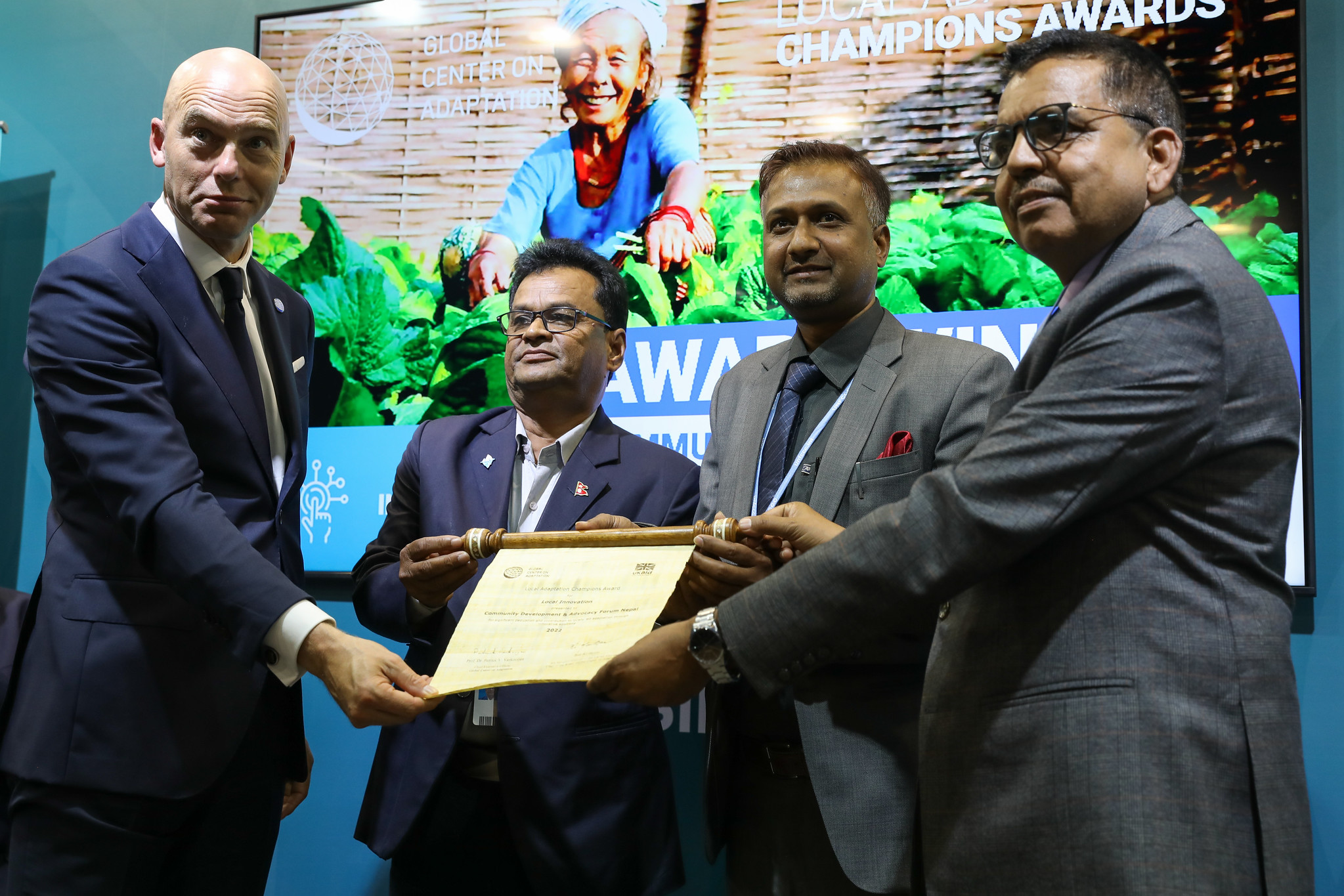
The Forum has led the way in mobilizing local communities in natural resource conservation, watershed conservation, river system management, and degraded land rehabilitation in a region of Nepal which is vulnerable to floods and desertification.
“Our intervention addresses the pressing issues associated with the livelihoods of the local community along the River basin from upstream Siwalik hills to downstream terai,” said Nagdev Yadav, President of the Community Development & Advocacy Forum Nepal. “Ground water is the only source of drinking water and irrigation for the communities in downstream areas, therefore rehabilitation efforts further upstream improve erosion and sedimentation control also makes water available for people downstream.”
“From mango, litchi, lemon and papaya to vegetables, degraded and dry riverbanks have been turned into green areas immediate and long-term income has been ensured to the landless and smallholders, benefitting more than 10,000 households. Before people had to dig or go far away to find drinking water. Now, communities have witnessed the results themselves: from growing only rice in one year, now they can grow maize, wheat, vegetables and fruits and they have seen the benefits on their nutrition and harvests.”
Selection Process
The award winners were selected by a prestigious jury, comprised by:
- Rania A. Al Mashat, Minister of International Cooperation of the Arab Republic of Egypt
- Professor Patrick V. Verkooijen, Chief Executive Officer of the Global Center on Adaptation
- Saima Wazed Putul, Thematic Ambassador for Vulnerability of The Climate Vulnerable Forum
- Sheela Patel, Director of the Society for Promotion of Area Resource Centres
- Ban Ki-moon, Chair of the Global Center on Adaptation Board and 8th Secretary-General of the United Nations.
For more information or interview requests:
Alex Gee
Head of Communications
Global Center on Adaptation
Alex.gee@gca.org
Notes to editors
About the Global Center on Adaptation
The Global Center on Adaptation (GCA) is an international organization which works as a solutions broker to accelerate action and support for adaptation solutions, from the international to the local, in partnership with the public and private sector. Founded in 2018, GCA operates from its headquarters in the largest floating office in the world, located in Rotterdam, the Netherlands. GCA has a worldwide network of regional offices in Abidjan, Cote d’Ivoire; Dhaka, Bangladesh and Beijing, China.
All photos courtesy of UN Climate Change/Kiara Worth